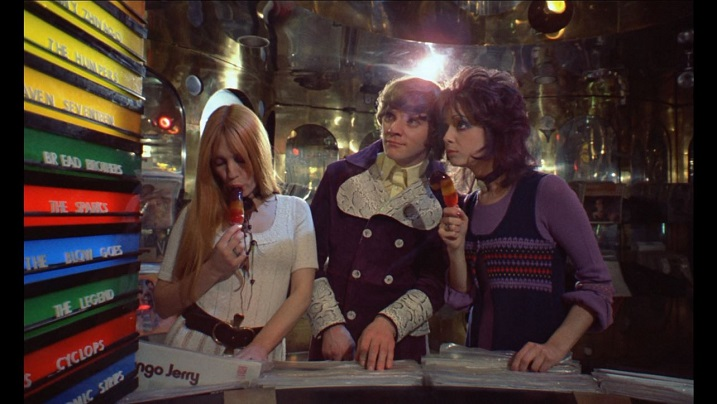
Storytelling and imagery in film changed dramatically in the 1970s, and with this being the first Kubrick movie I’ve reviewed, this blog is about to get really annoying.
A Clockwork Orange was one of the first really racy books I remember reading in high school. I remember my grandparents being quite appalled when I told them I was reading the book my senior year and even worse doing so for my own pleasure. I’m not surprised it wasn’t their jam. This is a story of inward turmoil, psychopathy, and impulse. But the horrorshow (so to speak) is not the text and graphic violence depicted in the story (and yes, it’s brutal), but the moral question of goodness and choice.
Our Humble Narrator Alex (Malcolm McDowell) is a wicked individual of pure sexual and violent impulse. His actions, driven by hedonism and rage, depict a textbook diagnosis of antisocial personality disorder. After committing several violent crimes, Alex finally winds up in prison for murder after his Droogs betray him and throw him to the wolves (cops).
Alex spends two years in prison currying favor with the bishop by presenting as the model prisoner. Mimicry is his skill. Eventually, a group of inspectors come looking for the perfect candidate to be reformed through a mysterious new treatment to cure him of his impulses. The treatment, though, makes Alex physically repulsed by violence.
It is a tale of morality and choice. What is a person’s humanity if they have no coice but to be good? Does a person’s intentions in this world matter at all? This is the moral pondering of A Clockwork Orange. Should we have a choice to be good?
Kubrick’s iteration of the source material is relatively faithful (save for a the final chapter discussing whether or not our Humble Narrator actually changed); but as I’m sure Anthony Burgess would be the first to point to the omitted chapter works against the central thesis of of the story. I do not feel I’m the one to litigate that, but I suppose there’s a reason the book is exactly 21 chapters.
At any rate, this film is outstanding. It is shot beautifully as every Kubrick film is. But it is McDowell’s performance that elevates this film so far beyond other character study films. McDowell is so measured in his performance flipping back and forth between likeable and menacing, earnest and manipulative, lawful and chaotic. He’s incredible. This is one of my favorite performances of all time.
Narratively and visually, this movie feels like a huge jump from the films of the 1960s. There is a grittiness that takes shape in the 1970s as Scorsese, Coppola, and Kubrick in particular really get the wheels turning. This even makes it’s way into the mainstream (Jaws and All The President’s Men immediately comes to mind). I like these changes. Maybe I’m just a cynic. Maybe I’m a film bro. At any rate, this is one of my favorite eras. We’re in a new Hollywood in 1971, and I really enjoy it.
On the whole, this is a very fantastic film and deserving of all the praise it receives. It’s scary, intense, and challenging. It forces you to confront your own morality in the experience. It’s in my top 20 of all time, and watching it again reminded me why.
10/10.
136 Minutes
Available on Prime Rental $3.99